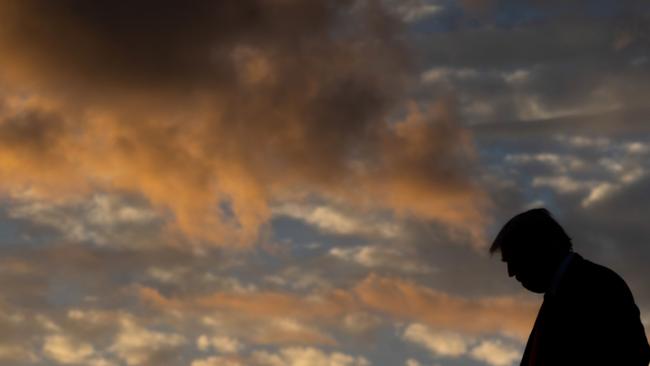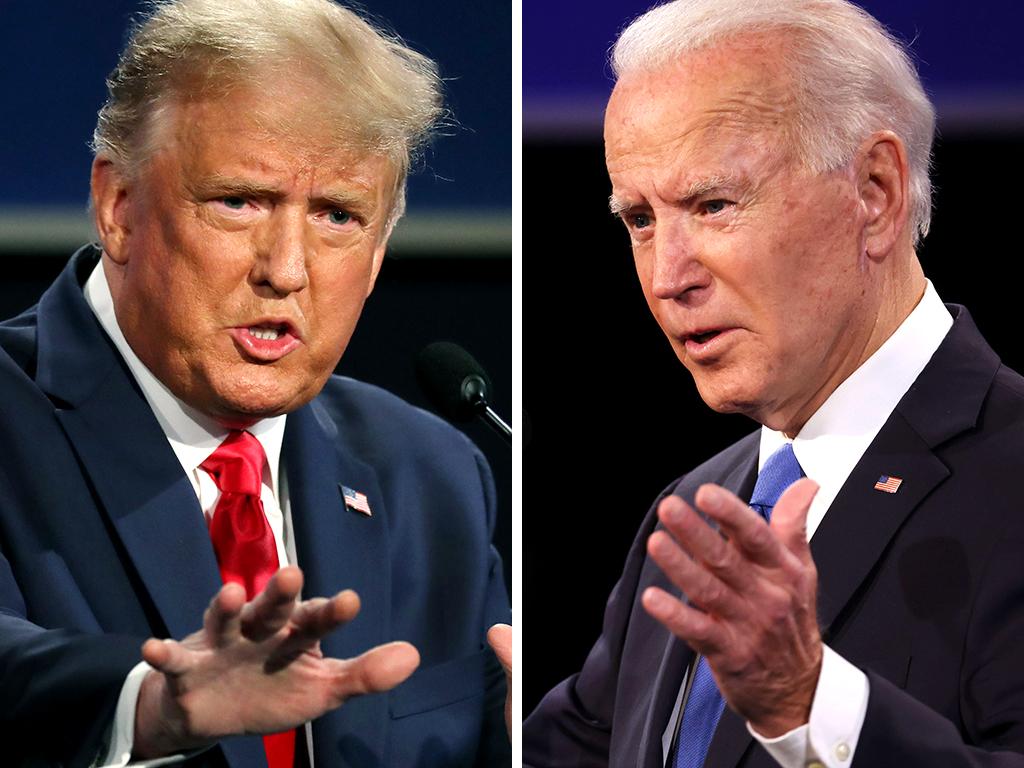US election 2020: Whoever wins, Americans deserve better the next time
The idea that the world will be a better place if Donald Trump is defeated does not stand up to scrutiny.

The truth is that in a vibrant democracy like the US, with powerful congressional, executive and judicial arms, 50 state governments with similar checks and balances, entrenched public services at federal, state and local levels, a vast, diverse and globally dominant private sector, and a complex arrangement of treaty, trade and alliance relationships, there are massive constraints on the extent to which a president can change the nation in two terms, let alone one.
Trump has done some good things, some bad things and some ugly things, but he has not changed the fabric of America, and nor would Joe Biden.
This is not to say presidents do not shape their country and the world. But we should not hyperventilate and overstate the rate and direction of change.
Trump’s personal failings are critiqued and exaggerated so widely and wildly that it seems superfluous to mention them. Yet, it needs to be recognised that his crassness, self-obsession, ill-discipline, vindictiveness and rhetorical inconsistencies are not what we would choose from a menu of presidential qualities.
To understand the reason he became president, we need to recognise that he exists to rebel against the misinformation, hateful abuse and ideological intolerance of the modern green left, which uses all the apparatus of the so-called elites and political establishment, along with mainstream and social media amplification, to undermine and attempt to delegitimise conservative views. He is no conservative himself, but Trump-the-disrupter exists to repel the progressives, to reclaim the nationalism, social values, law and order, and economic rationalism that matter to right-of-centre voters.
Trump rumbles at an ugly but effective level — Twitter level — and he often flushes out a leftist disdain for mainstream values (remember the deplorables) that helped propel him to the White House. Just because he is a populist, does not mean Trump has not exposed the excesses of the so-called elites and the modern green left. And just because his demeanour and diplomacy are gauche does not mean they have not sometimes been effective.
The rallies, tweets and interviews are entertaining, to be sure, infuriating to some. And the sport of journalists and political opponents has been to apply literal interpretations of his words and to scoff at them, while the intended audiences get his drift.
While Trump has not greatly changed his nation, he has coarsened the nature of political discourse. Most politicians on the right-of-centre just roll with the punches — they accept jaundiced journalism, slanderous assaults from social media, and endless attacks from celebrities as par for the course.
Hillary Clinton called Trump’s supporters racists, sexists, homophobes, Islamophobes and xenophobes, then urged Americans to “resist” Trump’s presidency. Robert DeNiro said he would punch Trump. Madonna said she dreamt of blowing up the White House. And comedian Kathy Griffin posed with a macabre model of Trump’s severed head. As a candidate, and from the Oval Office, Trump has refused to just take this; he hits back just as hard, just as juvenile.
The result is polarised and pugilistic but only the wilfully blind can pretend that the so-called liberal Left has not abandoned civil debate.
Perhaps the biggest change in the US over the past few decades has been the accelerated desperation and degradation of politics, and there are plenty to share the blame. Yet the Democrats and their media supporters claim all this will improve should Biden win the election.
Well, the riots would be called off I suppose, for a while. But people would be wise to worry deeply about the repercussions if extreme elements in the Defund the Police and Black Lives Matter outfits became dissatisfied and spied weakness in Washington.
If the polls in the US are correct, we might well find out. But then, the polls were narrowly awry last time, and the disincentive for voters to proclaim to pollsters, or anybody else, that they favour Trump has increased exponentially over the past four years.
If you want social exclusion, tell people you support Trump. Want an argument, do the same. Want abuse on the street, wear a Trump T-shirt.
The hatred directed by the so-called liberal left towards their perceived ideological opponents on social media and in the public square might have made conservative voting intentions almost impossible for pollsters to measure. We will see.
By the time you read this, I will have arrived in the US, a place many Australian commentators have been portraying as a dystopian society or failed state — such is the anti-Trump derangement. It happens also to be the most prosperous, open, innovative, powerful, free, generous and multicultural nation in the history of this planet. I expect to see very real problems with the pandemic and lockdowns but also to find that rumours of America’s demise are greatly exaggerated.
Assessments of Trump’s presidency ought to focus on his actions rather than his words, and predictions about the election ought to assume voters will come to reasonable conclusions. Before the pandemic his economic strategy — driven by tax cuts and luring manufacturing investments — had paid off.
COVID-19 turned all that on its head, just as it has in every nation. Incumbency can be a bonus in times of crisis, but this health and economic dilemma is especially challenging. Trump’s rhetoric has been feral, and his opponents are blaming him for infections and deaths, which is a bit lame. Nine countries have higher death rates than the US, and 10 have higher infection rates — we are talking about countries such as Spain, Belgium, and Brazil. And nations with comparable performances to the US include Britain and Italy.
Yet we constantly read that Trump’s management has been disastrous. His messaging has been discombobulating but he acted on foreign travel bans and boosting medical capacity quicker than most. In the US, as here, the key pandemic management decisions and disasters belong to the states.
Much criticism of Trump tends to be cliched and fact-free (I say this as someone who said he could win in 2016 while I hoped he would not). His most strident critics tend to be those who opposed his election and predicted it would not happen.
They seem to kid themselves that his defeat after one term would somehow vindicate them. It would not. Whatever happens on Tuesday week, they were hopelessly wrong last time around.
The critiques from the left often lack substance, and their sanctimony often backfires — as with CNN legal analyst and Trump character assassin Jeffrey Toobin who last week was caught masturbating on a Zoom meeting, or journalists who relentlessly accuse Trump of lying now exposed for three years of deceptions on the Russia collusion delusion, or major media companies that malign Trump as a bully, forced to pay compensation for defaming and shaming Catholic school student Nicholas Sandman because he dared to wear a MAGA hat.
They fail on substance too. They accuse Trump of ineptitude on foreign policy and border protection, yet his wall and unorthodox tactics have delivered border security that Republican and Democrat administrations routinely have promised, trade concessions from China and real progress in the Middle East.
By recognising Jerusalem as the capital of Israel, Trump brought a new realism to Middle East diplomacy. By imposing tariffs on China, he changed gears and lubricated the rusted cogs of trade negotiations. By pressuring NATO allies, he won new commitments. And by exiting Paris, he showed the way to a pragmatic, technology-based approach on emissions reduction.
Domestically, his deft Supreme Court appointments, in the face of repugnant opposition, will leave a lasting legacy. Few critics recognise any of this, which gives their game away. They get lost in the (admittedly compelling) distractions of chaotic appointments, resignations, and tweets.
The Democrats get away with portraying Trump as a threat to democracy when they have dubbed him illegitimate from the start and enjoined a “resistance” to try to force him from office.
We can only hope this is not the new norm; where election losers do not accept defeat and regroup, but rather claim injustice and work to subvert the authority of democratically installed governments.
The “shy voter” syndrome, Biden’s wobbles and near invisibility, along with Trump’s strength on law and order, could still deliver his re-election. If Trump wins, many commentators — and certainly the Democrat leadership — should hand in their badges because none of them has learned a single lesson from Trump’s 2016 victory.
If the Democrats win, they are likely to contend that their world view has been right all along, claiming vindication of their progressive and post-material agenda. That would be a mistake.
If Biden wins, an unorthodox and unconvincing president with a narrow majority, knocked asunder by the pandemic, hounded by the political and media establishment, will have been beaten. The Democrats will need to be reminded that their campaign has been about eradicating an ogre, not embracing an opus.
They would be forgiven a few moments of gloating about repelling the most unique and overbearing politician of our time. But they would need to be humble enough to learn a lesson or two from Trump.
A repudiation of Trump would represent a rejection of the sideshows and polarisation of the past four years — driven as much by the Democrats as The White House — and would signal a hankering for stability.
Should Biden win, he would be wise to emulate Trump’s respect for the mainstream and listen to them — patriotism, economic development, law and order and global leadership matter; they do not go out of fashion.
No matter the outcome, both the Republican and Democrat parties need to find better proponents in 2024.







The idea that the world will be a better place if Donald Trump is defeated does not stand up to scrutiny. There is little evidence, if any, to confirm that even the United States would benefit.